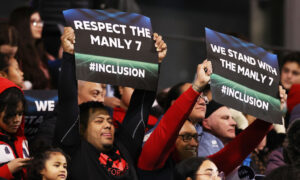Safety in Numbers
CommentaryI belong to a very small minority: the awful truth is that I’m not a big fan of team sports. All codes of football expect their players to show great personal and physical courage on the field, but moral conviction tends to get overlooked in the job description. I’m unhappy about that. In my 30 years as a college head in Australia, the worst case of homesickness I ever came across was that of a big bruiser of a rugby player who wept inconsolably on his first night away from home and was an emotional mess for several days afterwards. He succeeded in keeping it hidden from his mates, but he dropped his bundle with me, and his tutor. He settled down eventually, but in that first week or so, I was seriously concerned for his state of mind. Sure, at school, he had spent a night or two away from mum and dad on the occasional sleepover, but the prospect of being away for weeks at a time simply overwhelmed him—even though his home was only a three-hour drive away! His was an extreme instance of a state of mind that was not uncommon in my experience. By contrast, I’ve known shy little girls who fitted joyfully into college life from day one. It’s only fair to add that my lonely student was an extremely nice bloke who, in time, became a fine asset to the college. This is, of course, a crass generalization, but footballers, it seems, are not always good at being loners. They live for the team and the companionship of their mates. They stick together through thick and thin, ever loyal and steadfast. These are admirable qualities. Lone Wolf Is Easy Pickings But there is a downside: they need the constant approbation of their teammates, and if isolated, they stress easily (remember how upset Eddie McGuire was when accused of racism?) and are too ready to withdraw their support from any one of their number that breaks ranks and lets the side down. Frankly, they can easily slide into bullying. Think Israel Folau. But there is safety in numbers, so when seven members of the Manly Sea Eagles recently refused to wear the club’s new diversity pride jerseys, there was consternation. The Manly Sea Eagles rainbow pride jersey is seen on a player during the round 20 NRL match between the Manly Sea Eagles and the Sydney Roosters at 4 Pines Park in Sydney, Australia, on July 28, 2022. (Cameron Spencer/Getty Images) Hens might peck one weak chicken, but when you’re faced with half a dozen free spirits (who are also top players), it’s a different proposition entirely, and you have to do deals. In this case, the deal was that the manager declared his respect for the “spirituality” of the dissidents and apologized for offending them. The media tend to be a little reticent about the details, but it’s not difficult to glean that most of the rebel players are committed Christians from South Pacific nations. So was Folau, of course, but he was on his own and, therefore, fair game. His unpopular opinions could be—and were—given full coverage in the usual woke circles. All the patois of abuse was weaponised against him, of which “hate speech” is the particular favourite. Few had the courage to defend him; those who did were, as usual, ignored by mainstream media. He was reviled for his bigotry and for all the “hurt” he was said to have caused by expressing his honest convictions. The Joy of Church Lost in Australia I have had the good fortune to spend some time in Samoa and Tonga. One of the greatest pleasures of being there is probably quite beyond the appreciation of the majority of tourists: I’m talking about the joyful experience of going to Church on Sunday. Catholic or Protestant, it makes no difference: each church is thronged with worshippers, young and old. The happiness is infectious, and the singing is gorgeous. If there are any truly Christian countries left in the world, those little Polynesian island nations surely head the list. By contrast, our own young country Australia has drifted prematurely into a sad and cynical old age. We have lost so much of that youthful sparkle that characterises a truly Christian society—that sense that God is in his Heaven and that spring is in the air. In its place now, the dominant tone is pessimistic materialism, warmed a little by a groundless and sentimental faith in the essential “niceness” of people, and occasionally stiffened by a post-diluvian marxism determined to hold on to the notion that perfection can be achieved only by an ongoing class war between the woke and the deplorables. The saddest thing is that we now have to look to foreigners for exemplary Christian heroism. This is not the fault of our Australian-born Christians, but a sign that they have, for the most part, lost the ear and the respect of their countrymen; their spoilsport views are no longer heard or reported, let alone tolerated. We have become a heathen nation, and are being re-evangelised by missionaries from abroad (including Sea Eagles rugby players!), in one of those lovely inversion

Commentary
I belong to a very small minority: the awful truth is that I’m not a big fan of team sports. All codes of football expect their players to show great personal and physical courage on the field, but moral conviction tends to get overlooked in the job description.
I’m unhappy about that. In my 30 years as a college head in Australia, the worst case of homesickness I ever came across was that of a big bruiser of a rugby player who wept inconsolably on his first night away from home and was an emotional mess for several days afterwards.
He succeeded in keeping it hidden from his mates, but he dropped his bundle with me, and his tutor.
He settled down eventually, but in that first week or so, I was seriously concerned for his state of mind. Sure, at school, he had spent a night or two away from mum and dad on the occasional sleepover, but the prospect of being away for weeks at a time simply overwhelmed him—even though his home was only a three-hour drive away!
His was an extreme instance of a state of mind that was not uncommon in my experience. By contrast, I’ve known shy little girls who fitted joyfully into college life from day one. It’s only fair to add that my lonely student was an extremely nice bloke who, in time, became a fine asset to the college.
This is, of course, a crass generalization, but footballers, it seems, are not always good at being loners. They live for the team and the companionship of their mates. They stick together through thick and thin, ever loyal and steadfast. These are admirable qualities.
Lone Wolf Is Easy Pickings
But there is a downside: they need the constant approbation of their teammates, and if isolated, they stress easily (remember how upset Eddie McGuire was when accused of racism?) and are too ready to withdraw their support from any one of their number that breaks ranks and lets the side down. Frankly, they can easily slide into bullying. Think Israel Folau.
But there is safety in numbers, so when seven members of the Manly Sea Eagles recently refused to wear the club’s new diversity pride jerseys, there was consternation.

Hens might peck one weak chicken, but when you’re faced with half a dozen free spirits (who are also top players), it’s a different proposition entirely, and you have to do deals. In this case, the deal was that the manager declared his respect for the “spirituality” of the dissidents and apologized for offending them.
The media tend to be a little reticent about the details, but it’s not difficult to glean that most of the rebel players are committed Christians from South Pacific nations.
So was Folau, of course, but he was on his own and, therefore, fair game. His unpopular opinions could be—and were—given full coverage in the usual woke circles. All the patois of abuse was weaponised against him, of which “hate speech” is the particular favourite. Few had the courage to defend him; those who did were, as usual, ignored by mainstream media. He was reviled for his bigotry and for all the “hurt” he was said to have caused by expressing his honest convictions.
The Joy of Church Lost in Australia
I have had the good fortune to spend some time in Samoa and Tonga. One of the greatest pleasures of being there is probably quite beyond the appreciation of the majority of tourists: I’m talking about the joyful experience of going to Church on Sunday.
Catholic or Protestant, it makes no difference: each church is thronged with worshippers, young and old. The happiness is infectious, and the singing is gorgeous. If there are any truly Christian countries left in the world, those little Polynesian island nations surely head the list.
By contrast, our own young country Australia has drifted prematurely into a sad and cynical old age. We have lost so much of that youthful sparkle that characterises a truly Christian society—that sense that God is in his Heaven and that spring is in the air.
In its place now, the dominant tone is pessimistic materialism, warmed a little by a groundless and sentimental faith in the essential “niceness” of people, and occasionally stiffened by a post-diluvian marxism determined to hold on to the notion that perfection can be achieved only by an ongoing class war between the woke and the deplorables.
The saddest thing is that we now have to look to foreigners for exemplary Christian heroism. This is not the fault of our Australian-born Christians, but a sign that they have, for the most part, lost the ear and the respect of their countrymen; their spoilsport views are no longer heard or reported, let alone tolerated.
We have become a heathen nation, and are being re-evangelised by missionaries from abroad (including Sea Eagles rugby players!), in one of those lovely inversions of history that force us to see things differently.
So must heathenised people in Western Europe have viewed St. Columbanus’s Irishmen, with their quaint accents, who brought the Gospel back to them again after the chaos of the barbarian invasions!
Views expressed in this article are the opinions of the author and do not necessarily reflect the views of The Epoch Times.












